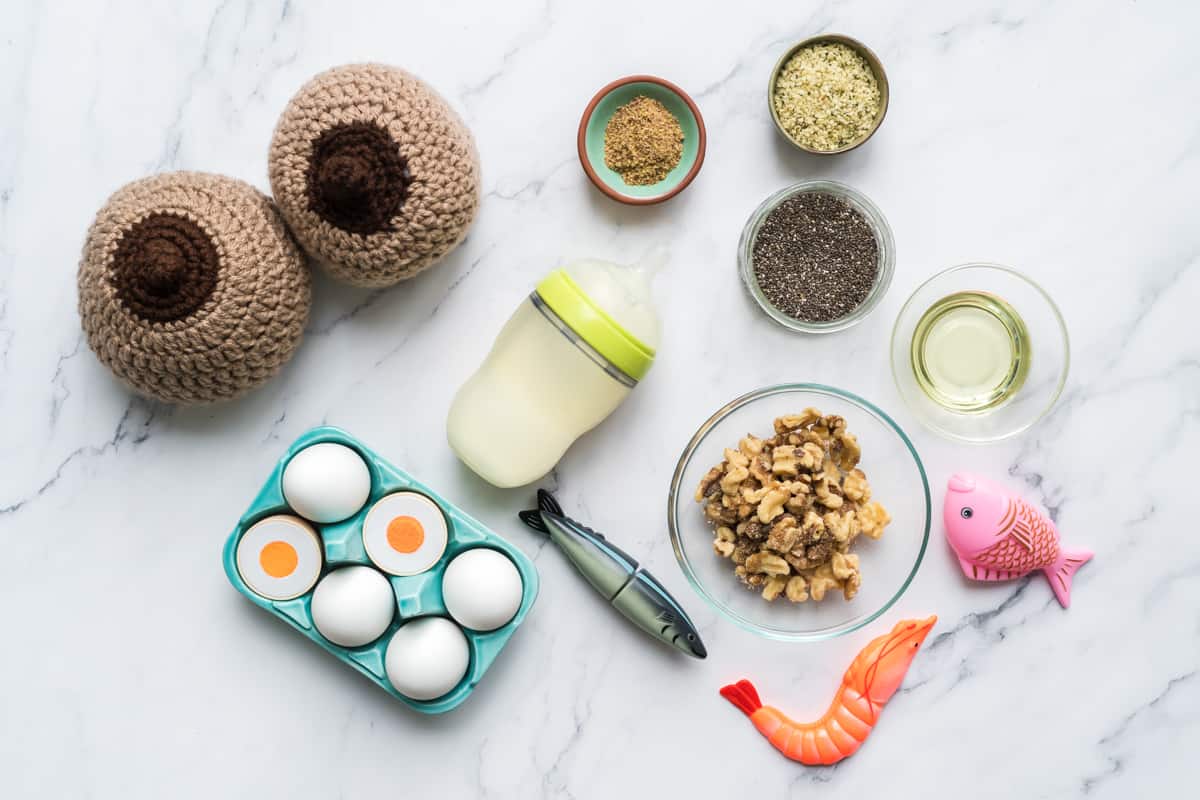Ensuring our baby is getting all their nutrients is, let’s face it, HARD WORK!! Despite being super busy, I bet you often hear all these facts about what nutrient and the dosage you should feed baby, and they have got you confuuuused. If this sounds like you, don’t worry, we got you!
Especially when it comes to omega 3! If you have heard the term omega 3, you may hear how adults are not getting enough. Well, we’re here to highlight that your baby needs their fair share too! Omega 3 is essential at all life stages, so yes, our little ones need omega 3 and let’s discuss why and most importantly, WHERE you can find it!
In this guide you'll learn:
What is omega 3?
Omega 3 is an essential fatty acid that the body uses for proper development. The word essential means that your body needs it from food sources! It comes in three forms, alpha-linolenic acid (ALA), eicosapentaenoic acid (EPA) and docosahexaenoic acid (DHA). Both EPA and DHA are normally found in marine plants and animals like fish and algae! In contrast, ALA is found in plant foods such as flaxseed, soybean, and canola to name a few.
Why does my baby need omega 3?
Infants need omega 3 for many reasons.
- Omega 3 is crucial for neurological and eye development in the early stages of life.
- Omega 3 could provide cardiovascular benefits such as lowering systolic blood pressure during the second half of infancy.
- It can help the immune system by protecting the child against allergies in early childhood and it is good for bone health. The research in this area is still evolving!
Where can I get omega 3 for my baby?
For infants (birth – 12 months), the amount deemed adequate for omega 3 is 0.5 grams.
There are a few ways for your baby to get omega 3:
- Human milk
- Formula fortified with omega 3
- Marine foods
- Plant based foods
- Fortified foods
- Supplements
Human Milk
Human milk is a great source of omega 3 for baby. However, the amount of omega 3 baby receives is dependent on the amount the nursing parent is consuming. If you consume a vegetarian/vegan diet or limit your fish intake, you might want to speak to your dietitian about supplementing.
Fun Fact: high levels of DHA in human breast milk are directly correlated with optimal growth and development of the brain and the visual system.
Infant Formula
If your baby is being offered formula or perhaps a combination of formula and human milk, they can still reap the benefits of omega 3! Most formulas on the market contain DHA at the recommended levels. If you are unsure if it contains DHA just read the nutrition label or ingredient list.

Marine Foods
When deciding how to get enough omega 3 in your baby’s diet, think fish! The best sources are fatty (oily) fish such as salmon, trout, and herring; which are all low in mercury, yaay! You can also include sardines and mackerel.

Plant Based Foods
There are also plant-based sources of omega 3. This are especially handy if your baby is vegetarian or vegan. These sources include flaxseed, chia seeds, nuts, seeds, and vegetable oils (such as flaxseed oil, soybean oil and canola oil).

Fortified Foods
There are many sources of foods that have had omega 3 added to them. You might be thinking, well how would I know what is fortified? We can help you with that! Look at the food item’s nutrition facts label or ingredient list and it will say DHA, linolenic acid, or omega 3 (remember omega 3 has other terms). Some examples of foods that are fortified with omega 3 include infant formula, eggs, certain yogurts, milk and juice.
Omega 3 Supplements
Getting nutrients from food is the best way, but if you’re finding your baby is not getting enough omega 3 from their diet, you may want to look at supplementing it. It is best to discuss with your dietitian what is best for your baby.
Is omega 3 safe for my baby?
Yes, food sources of omega 3 are safe for your baby, in fact they need it for proper development! Just remember, too much of anything is never good.
What If My Baby Doesn’t Get Any Omega 3?
You want to make sure your precious little one is receiving enough omega 3 so they can develop to their full potential, especially between the ages of 0 months to 24 months. There’s a lot of research around the importance of nutrition in the first 1000 days! It’s soooo fascinating. An omega 3 deficiency and imbalance are linked to impairments in cognitive and behavioural performance of the child. Take a look at the list of foods we shared above that contain omega 3. If your baby doesn’t consume any of those foods, think about ways that you can start to include them!
In summary, pregnancy, lactation periods and the introduction to solid foods are all important periods to offer your baby (and you!) omega 3’s.
Human milk or fortified infant formula are the best ways for your baby to receive their omega 3 content, especially between birth and 6 months, which is when you’ll likely start solids.
If you’re looking for some baby food ideas that are rich in omega 3, our book, Whole Food Recipes for Your Baby has loads of ideas. Here are some of the recipes that contain omega 3:
- Pesto Tuna Potato Cakes
- Cajun Shrimp Cakes
- Creamy Chia Seed Pudding
- Brain Boosting Tofu
- Sweet Potato Salmon Cakes
- Go Baby Go Puree
- Green Pea Guacamole
- Fruity Tofu Yogurt
A huge shoutout to University of Manitoba human nutritional sciences practicum student, Caitlynn Danchuk for contributing her tremendous research and writing skills to this article!
References:
Government of Canada. (2019, November 27). Mercury in fish- questions and answers.
House, J. (2017). The parents’ guide to baby-led weaning. Robert Rose Inc.






